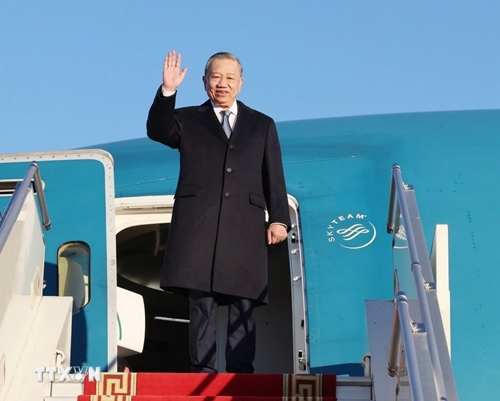During his stay in Mongolia, Party General Secretary and State President To Lam held talks with President Ukhnaagiin Khurelsukh, met with Chairman of the Parliament Dashzegviin Amarbayasgalan and Prime Minister Luvsannamsrain Oyun-Erdene, and attended the opening of the Vietnam Cultural Day 2024. He also visited the Inter-Level School No.14 named after President Ho Chi Minh, met with staff from the Vietnamese Embassy and the Vietnamese community in Mongolia, and representatives from several Mongolian business organisations.
    |
 |
|
Party General Secretary and State President To Lam leaves Ulaanbaatar. |
Throughout their meetings, the leaders from both countries highly valued the Vietnam-Mongolia traditional friendship spanning over seven decades. They engaged in extensive discussions on the future development of bilateral relations, as well as global and regional issues of mutual interest.
The Mongolian side affirmed that they always consider Vietnam an important partner in Southeast Asia and expressed a desire to further expand mutually beneficial cooperation across various areas.
Vietnam, in turn, underscored the importance of developing its relations with Mongolia, respecting Mongolia’s peace-loving, open, independent, and multi-pillar foreign policy, as well as its "third neighbour" policy. Vietnam also wished to further strengthen bilateral ties in the coming time.
The leaders agreed that deepening and developing Vietnam-Mongolia ties match the shared interests of their people and make a significant contribution to ensuring peace, stability, and development in the region and the world. They concurred on the need to upgrade their relations to a comprehensive partnership and further expand collaboration.
Both sides vowed to facilitate the exchange of all-level delegations through the Party, State, Government, and National Assembly channels. They also vowed to support the policy of expanding close relations between the people of both countries and exploring the possibility of establishing new cooperation mechanisms among the two nations' ministries, sectors, and localities.
A commitment to extending collaboration in national defence-security, law enforcement, economy-trade-investment, agriculture, science, transportation, culture, sports, tourism, education, labour, environment, and social welfare was also made, along with enhancing global and regional cooperation.
Both sides signed seven memoranda of understanding on cooperation between relevant ministries and units.
The visit played a crucial role in guiding and opening up new prospects for the friendship and cooperation between the two countries.
Source: VNA